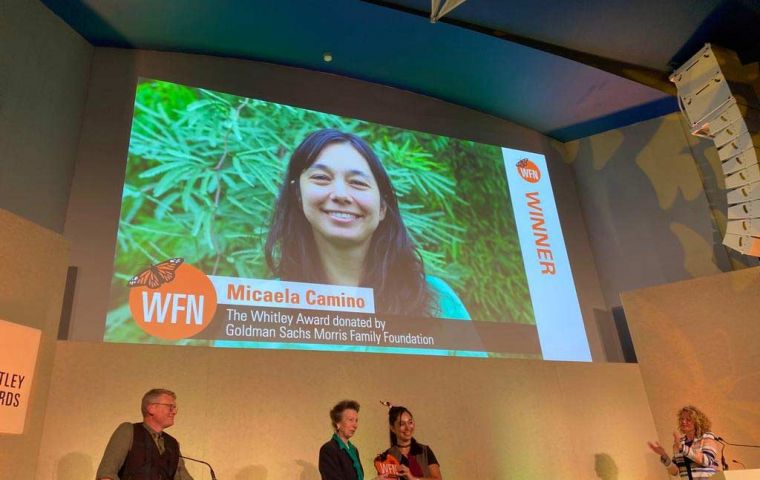MercoPress. South Atlantic News Agency
Whitley Fund's Green Oscar goes to Argentine Chaco conservationist
 Camino received her award from Princess Anne
Camino received her award from Princess Anne Argentina's Micaela Camino was awarded Thursday the so-called “Green Oscar” by the British Whitley Fund For Nature (WFN) for her research work to safeguard the dry Chaco forest.
“This award is crazy, it is a very competitive international recognition and I am very happy,” said Camino, who received her prize from Princess Anne, Queen Elizabeth II's daughter. “They are very attentive, they know what I do. I'm sharing the award with other people who do amazing things. We have workdays that are beautiful because I learn things about other places,” Camino added.
The 39-year-old Camino was born and raised in Buenos Aires. She has lived in Chaco for ten years and is married to Sara, with whom she shares the upbringing of a four-year-old son. She studied Biology,
completed a PhD at the University of Buenos Aires and is starting a research career at the National Council for Scientific and Technical Research (CONICET).
Whitley Fund for Nature is a UK fundraising and grant-making charity that supports conservation leaders working in their home countries, and awards the annual “Green Oscar.” The award, which grants 40,000 pounds (about US$ 50,000) to each winner, is one of the most prestigious international conservation prizes awarded to leading conservationists from Asia, Africa and Latin America deemed “pioneers in solutions to the biodiversity crisis.”
It also awards a special prize of £100,000 (US$125,000), which this year went to renowned conservationist Charu Mishra, executive director of the International Snow Leopard Trust and co-founder of the Nature Conservation Foundation of India.
“This recognition fills us with pride and joy because we have been working for a long time. It is not just me, it is a group of people with whom we work horizontally and it is called Proyecto Quimilero,” Camino also explained. The chimilero peccary is a species that only exists in the forests of the dry Chaco, a region that extends through Argentina, Paraguay, and Bolivia.
The group is focused on “applied conservation biology,” she added. “We always work with people with a conservation perspective and with integrated communities,” Camino also pointed out
“The peccary is a species that represents a unique evolutionary pathway that is super threatened by the advance of deforestation to industrially produce soybeans or pastures for cattle ranching,” leading to this species being in serious danger of extinction, the award-winning scientist went on.
Caminos also stressed that “the pandemic, the climate [crisis], and the world are showing that the way we are living with nature is not healthy and is not doing us any good.”
“I believe that the solutions have to be collective and have to include everyone and everything, and especially when we talk about conservation, we have to take into account that many of the places or species that fascinate and matter to us have to do with the life of local communities, who know a lot and have been interacting with these systems and species for centuries, and it is important to build solutions together,” she went on.
“We saw that the chimilero peccary was present, but unfortunately we saw that it is very threatened by deforestation because it loses its habitat. We estimate -looking only at its habitat- we have 30 years left to save this species,” she also pointed out.
“Our goal is to manage to conserve the chimilero and its habitat in the long term, working with local communities who know a great deal. The idea is to be able to have all rights guaranteed, to live well and develop them, but at the same time to conserve our forests. This in no way means not touching them, but finding a way to achieve a healthy coexistence with nature,” she elaborated.




Top Comments
Disclaimer & comment rulesCommenting for this story is now closed.
If you have a Facebook account, become a fan and comment on our Facebook Page!